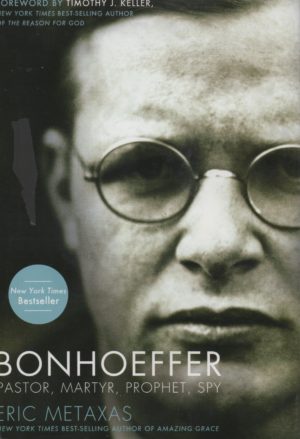
Marvelous. That’s the one word I’d use to describe this fine biography as well as the exemplary life lived by Lutheran theologian, Dietrich Bonhoeffer. Prescient is also another word that fits here. Unlike many of the Lutheran pastors of his time, Bonhoeffer recognized Adolph Hitler, long before the Night of the Long Knives, long before the burning of books, long before the rounding up of the Jews and other “undesireables”, for what he was: evil. Unvarnished, uncontrolled, and unrepentant evil.
Metaxas takes us through Dietrich’s early life, his education, his loves, and his relationships with mentors, friends, and family: something completely expected in a massive biography such as this. But more importantly, it is the author’s painstaking recreation of his subject’s metamorphosis from pulpit skeptic of Hitler to would-be assassin, that drives this work:
I am hopelessly torn here, going to India and returning to Germany to take charge of a preacher’s seminary shortly to be opened there. I no longer believe in the university…It is high time we broke with our theologically based restraint towards the state’s actions-which, after all, is only fear. “Speak out for those who cannot speak”-who in the church today realizes that this is the very least that the Bible requires us to do?
(Letter of 9/11/34 to E. Sutz)
The use of original source material, as I did in Mr. Environment: The Willard Munger Story, can lead a reader to become bogged down in minutia. But the author avoids that here and, in almost every instance, the original source material clarifies the subject’s evolution from pacifist to conspirator. Even though I knew the ultimate, horrific fate that awaited this kind and genteel man for his participation in the conspiracy to kill Hitler, I found the road to that conclusion fascinating. I especially enjoyed Metaxas’s detailed revelation of the Confessing Church’s role in pastoral opposition to Hitler, to include, in Bonhoeffer’s case, being willing to take the matter further and actually plan the assassination of the Nazi leader. That principled stand is starkly different from the fawning adoration expressed by the State Lutheran Church for Hitler and his policies. “Make Germany Great Again” could well have been the catch phrase that the official church adopted as part of its creed; a creed by which pastors and leaders turned a blind eye to the truth: Adolph Hitler was not a Christian, had no love for his fellow man, and was, if there is such a being, Satan incarnate. Bringing Germany back from the bowels of desperation occasioned by the nation’s humility at the conclusion of the Great War was good enough for leaders of the state-sanctioned church to turn a blind eye to this reality.
I find it interesting that, here in the U.S., leaders of the Evangelical movement have adopted our current leader and his nationalistic, “Make America Great Again” slogan much like the state church in Germany adopted the ideas and policies of Adolph Hitler. Church leaders on the Right seem willing to ignore the fact that our current leader neither espouses nor embraces the tenets of Christianity that Bonhoeffer spoke about in sermon after sermon: piety, love of God, modesty, charity for one’s neighbor, love for those who don’t love us, and on and on. I make no claim that Donald Trump is the essence of evil that Adolph Hitler clearly proved to be. But I also think that the evidence is very clear Trump is not someone who “speaks for those who cannot speak”. Failing to understand the similarities between then and now is to miss the arc of Dietrich Bonhoeffer’s life’s work and his sacrifice.
4 and 1/2 stars out of 5.
Peace.
Mark


